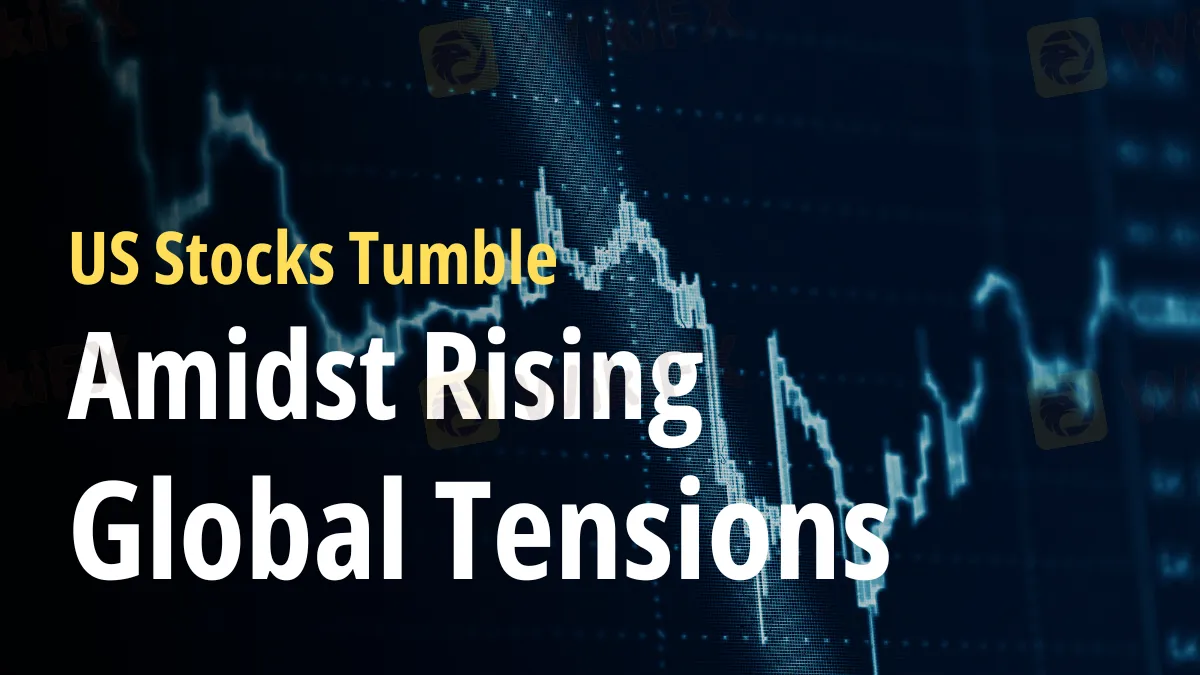简体中文
繁體中文
English
Pусский
日本語
ภาษาไทย
Tiếng Việt
Bahasa Indonesia
Español
हिन्दी
Filippiiniläinen
Français
Deutsch
Português
Türkçe
한국어
العربية
US Stocks Tumble Amidst Rising Global Tensions
Abstract:US stocks decline amid rising tensions between Israel and Iran, causing instability in global markets.

The decrease in the stock market may be attributed to a combination of recent economic statistics and increasing concerns about the escalation of wars in the Middle East, notably in response to Iran's recent military maneuvers. During the weekend, there was a significant escalation of regional tensions as Iran initiated an unparalleled onslaught against Israel. Surprisingly, oil prices saw a fall. Specifically, a barrel of Brent crude ended at $90.10, while a barrel of US WTI dropped to $85.41.
Based on the following response of the stock market, it can be seen that the CNN Fear & Greed Index has transitioned into a condition of “fear” for the first time since November, signifying an increased degree of investor unease. The index, which considers seven separate market attitude indicators, indicates a rise in traders' prudence.

US Treasury rates climbed, exacerbating the market's problems, as retail sales data showed that March saw a rise in consumer expenditure for the second straight month. Despite the Federal Reserve keeping interest rates at a 23-year high, this increase in spending demonstrates the US consumer's continued tenacity. Because of this, there are worries that the Fed may not be able to lower interest rates very soon due to consistently high inflation and a strong economy.
The response was not uniform worldwide. European equities had moderate increases, with the DAX in Germany and the CAC 40 in France both seeing minor increases. On the other hand, the FTSE 100 in London dropped 0.4%. Asia's markets mostly trended down; the Nikkei 225 in Japan and the Hang Seng in Hong Kong both closed at lower levels.
The unpredictability also caused the gold market to respond, with gold futures climbing to almost $2,383 a troy ounce—a 16% rise this year. Investors are shifting towards safer assets as geopolitical and economic upheaval unfolds.
The International Energy Agency, headquartered in Paris, and experts have expressed serious worries about possible interruptions to global oil supplies as a consequence of the current intensification of Middle Eastern wars. The latter emphasized the need to ensure energy security under the current unpredictable circumstances, noting that the occurrences of the preceding weekend had heightened the probability of heightened instability in the oil markets.
The world is now focused on Israel's next action as tensions continue to rise. The magnitude of the threat to international markets and stability may depend critically on Israel's government's reaction after lengthy war cabinet deliberations.
With the potential for further economic consequences based on geopolitical events in the next several days, investors are still wary as they navigate through these difficult times.

Disclaimer:
The views in this article only represent the author's personal views, and do not constitute investment advice on this platform. This platform does not guarantee the accuracy, completeness and timeliness of the information in the article, and will not be liable for any loss caused by the use of or reliance on the information in the article.
Read more

Is Your Zodiac Sign Fated for Stock Market Success in 2025?
The idea that astrology could influence success in the stock market may seem improbable, yet many traders find value in examining personality traits linked to their zodiac signs. While it may not replace market analysis, understanding these tendencies might offer insights into trading behaviour.

Kraken Offers $105 Fee Credit for FTX Fund Recipients
Kraken offers $105 in trading fee credits to FTX fund recipients, enabling $50,000 in crypto trading on Kraken Pro with zero fees. Secure your funds today!

Good News Malaysia: Ready for 5% GDP Growth in 2025!
Malaysia's economy is on track to sustain its robust growth, with GDP expected to exceed 5% in 2025, according to key government officials. The nation's economic resilience is being driven by strong foreign investments and targeted government initiatives designed to mitigate global economic risks.

Oriental Kopi’s IPO: Worth the Buzz or Not?
Kopi Holdings Bhd, a café chain operator under the brand Oriental Kopi, is gearing up for its listing on the ACE Market of Bursa Malaysia. The company has garnered a positive valuation from Mercury Securities Sdn Bhd, which has assigned a fair value of 68 sen per share, citing strong earnings growth potential driven by outlet expansions and increasing contributions from fast-moving consumer goods (FMCG) sales.
WikiFX Broker
Latest News
Bitcoin in 2025: The Opportunities and Challenges Ahead
BI Apprehends Japanese Scam Leader in Manila
Join the Event & Level Up Your Forex Journey
Is There Still Opportunity as Gold Reaches 4-Week High?
Bitcoin miner\s claim to recover £600m in Newport tip thrown out
Good News Malaysia: Ready for 5% GDP Growth in 2025!
FXCL Lucky Winter Festival Begins
Warning Against MarketsVox
Is the stronger dollar a threat to oil prices?
Rising Risk of Japan Intervening in the Yen's Exchange Rate
Currency Calculator






